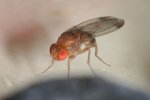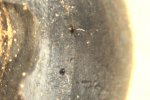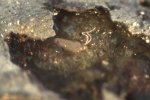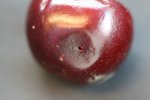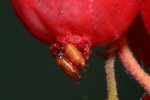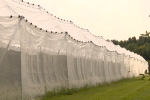
Drosophila Suzukii - how can fruit growers cope with this pest?
Drosophila suzukii is an invasive fruit fly in The Netherlands, that is increasingly common in Europe and can cause major damage in fruit production. Nets can help prevent damage, but we are also looking for other methods to help fruit growers in their fight against this exotic species.
Why is Drosophila Suzukii more harmful than ordinary fruit flies?
Ordinary fruit flies lay their eggs on damaged, overripe or decaying fruit. In contrast, Drosophila Suzukii females can use their serrated ovipositor to lay their eggs in fruit that is still ripening and is undamaged. The pest causes damage in many types of fruit, including strawberries, blueberries, raspberries, blackberries, cherries and plums.
How do you recognize Drosophila Suzukii?
Adult Drosophila Suzukii have the typical appearance of fruit flies: they are 2-3 mm long, with red eyes and a light brown abdomen with black stripes. Overwintering flies are somewhat darker than the ones present in the summer. The males have a few striking dark spots on their wings, from which the species draws its English name: Spotted Wing Drosophila. The females lay their eggs just under the skin of the fruit. After the eggs have been laid, two respiratory filaments protrude through the skin. These can be seen with a magnifying glass.
Click on the image for a larger photo
When do they lay the eggs?
Females that survive the winter are ready to lay eggs in April. They lay eggs on the fruit of Aucuba, Hedera (ivy), Elaeagnus, and other non-crop plants. The population of Drosophila Suzukii grows rapidly as soon as cherries and other summer fruits start to ripen. In favourable circumstances, a female can lay hundreds of eggs, and at 20°C a complete generation takes only 16 days. Up to seven generations can develop in a single season. What can fruit growers do to cope with Drosophila Suzukii? Good hygiene during the growing season is very important. By frequently and thoroughly harvesting ripe fruit and removing and destroying rotting fruit, the development of new generations of fruit flies can be prevented.
Pubications about Drosophila Suzukii:
- Drosophila Suzukii can use a large number of plant species as hosts. An overview of the species can be found in the publication Non-crop plants used as hosts by Drosophila suzukii in Europe
- A detailed overview of the life of Drosophila Suzukii in the spring can be found in the publication Overwintered Drosophila suzukii are the main source for infestations of the first fruit crops of the season
